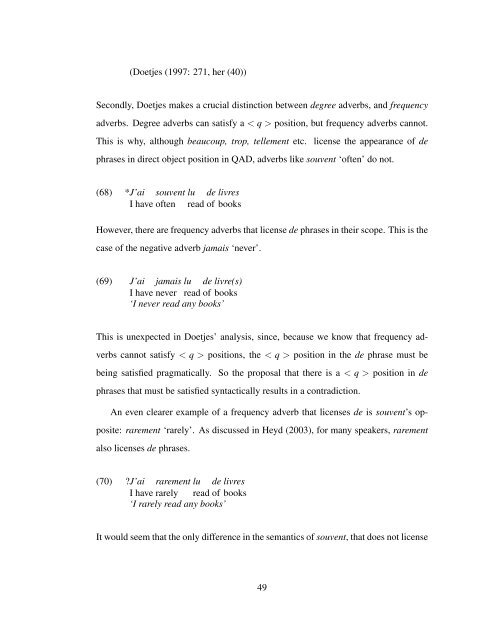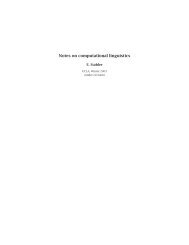Formal Approaches to Semantic Microvariation: Adverbial ...
Formal Approaches to Semantic Microvariation: Adverbial ...
Formal Approaches to Semantic Microvariation: Adverbial ...
You also want an ePaper? Increase the reach of your titles
YUMPU automatically turns print PDFs into web optimized ePapers that Google loves.
(Doetjes (1997: 271, her (40))<br />
Secondly, Doetjes makes a crucial distinction between degree adverbs, and frequency<br />
adverbs. Degree adverbs can satisfy a < q > position, but frequency adverbs cannot.<br />
This is why, although beaucoup, trop, tellement etc. license the appearance of de<br />
phrases in direct object position in QAD, adverbs like souvent ‘often’ do not.<br />
(68) *J’ai souvent lu de livres<br />
I have often read of books<br />
However, there are frequency adverbs that license de phrases in their scope. This is the<br />
case of the negative adverb jamais ‘never’.<br />
(69) J’ai jamais lu de livre(s)<br />
I have never read of books<br />
‘I never read any books’<br />
This is unexpected in Doetjes’ analysis, since, because we know that frequency adverbs<br />
cannot satisfy < q > positions, the < q > position in the de phrase must be<br />
being satisfied pragmatically. So the proposal that there is a < q > position in de<br />
phrases that must be satisfied syntactically results in a contradiction.<br />
An even clearer example of a frequency adverb that licenses de is souvent’s opposite:<br />
rarement ‘rarely’. As discussed in Heyd (2003), for many speakers, rarement<br />
also licenses de phrases.<br />
(70) ?J’ai rarement lu de livres<br />
I have rarely read of books<br />
‘I rarely read any books’<br />
It would seem that the only difference in the semantics of souvent, that does not license<br />
49
















